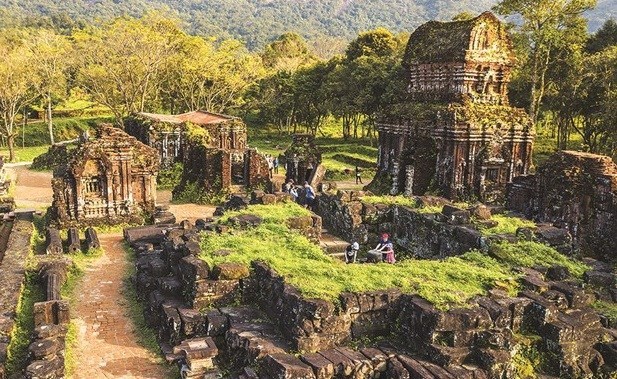Archeological excavation starts on part of My Son World Cultural Heritage Site
Archeological exploration and excavation on the eastern part of tower K in the My Son Sanctuary - a UNESCO-recognised World Cultural Heritage Site in the central province of Quang Nam, started on March 15 by the Institute of Archaeology in coordination with the Management Board of the site.
 My Son Sanctuary is recognised as a world cultural heritage site by UNESCO in 1999 (Photo: VNA)
My Son Sanctuary is recognised as a world cultural heritage site by UNESCO in 1999 (Photo: VNA)The exploration and excavation site covers 220 sq.m, including an exploration area of 20 sq.m and an excavation area of 200 sq.m.
Artifacts collected during the archaeological exploration and excavation process will be kept by the My Son World Heritage Management Board.
Along with organising archaeological exploration and excavation, recently, the My Son World Cultural Heritage Management Board has coordinated with domestic and foreign partners to conduct maintenance and restoration of towers G, H, A, K, while reinforcing the supports of towers in the site and researching the age of the bricks and the stratigraphy in the area.
To improve the quality of conservation work and promote heritage values, the My Son World Cultural Heritage Management Board is currently coordinating with relevant agencies to excavate the path from tower K to towers E and F and expand the walkways outside the three towers of B, C and D to reduce pressure on the site.
Once the religious and political capital of the Champa Kingdom, My Son relic site is located in a hilly landscape in Duy Phu commune, Duy Xuyen district, about 70 km southwest of Da Nang city and 40 km from Hoi An city.
It comprises eight groups of 71 monument built throughout the 7th -13th centuries.
The temples in My Son were built into groups that basically followed the same model. Each group was comprised of a main sanctuary (Kalan), surrounded by towers and auxiliary monuments. The towers, topped with tiled, covered roofs, were stocked with offerings and sacred objects of the pilgrims. Cham temples do not have windows, so they are very dark inside. Windows are found only in the towers.
However, there were only about 20 towers remaining./.













